History of Emotions
Director: Ute Frevert
Introductory Overview
The Development of the Center for the History of Emotions
Public Colloquia, Conferences, and Workshops
Internal and External Cooperation
Visiting Researchers and New Colleagues
When the Center for the History of Emotions was established at the MPI for Human Development in 2008, we started from two assumptions: Emotions make history, and emotions have a history.
Recent history has—unfortunately—proven the first assumption right. On 24 February 2022, Russia attacked Ukraine, and the war has not yet ended. Tensions had been building since at least 2014. Vladimir Putin felt threatened by Western powers who, he alleged, wanted to destroy the Russian state, and were using Ukraine as a deployment zone. Defining, in 2005, the collapse of the Soviet Union as the “biggest geopolitical catastrophe” of the 20th century, Putin flagged his concerns for Russia’s security, stability, and power. Guided by a strong sense of nostalgia, he also made reference to acute experiences of humiliation, since the West, and the US in particular, no longer treated Russia the way she expected to be treated.
Whether Putin personally felt nostalgic and humiliated, and why, is less important than the fact that he used these emotions to carve out an aggressive politics against Ukraine and sell it to his people. His speeches and texts serve as a classic case of emotional politics: Emotions—especially love for home, family, and, above all, the motherland, “that deep-seated intimate feeling”—were enlisted as “the backbone of our country’s sovereignty.” This had been the lesson learned during the “Great Patriotic War” between 1941 and 1945, and the lesson would again be applied to the “special operation” starting in 2022. In the absence of counternarratives, Putin’s emotional politics find a successful echo among Russian citizens.
Needless to say, we, the researchers at the Center for the History of Emotions, would rather not have been given this case to study. Indeed, history has provided us with enough material to analyze how emotions have made history. Emotions have often been regarded as private, as the innermost core of an individual subject. But they are never only private. They are as much located between people as they are inside a person. As such, they motivate human behavior and foster the formation of social groups or movements. Emotions are also much more than affects. They are learned and cultivated in the life course; they can be manipulated, heightened, or channeled. What would modernity be without patriotism (see above) and national pride, without the addiction to honor and the fear of disgrace, without communities acting in unison driven by shared anger or hope? Can we imagine a political world or a world of consumption without continuous appeals to our emotions? The history of emotions raises new questions, but it also contributes a new entry point to questions about power and social change that historians have debated for a long time.
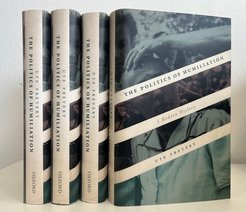
And what do we know about emotions’ historicity? Are emotions not an anthropological constant shaped through biological evolution? Although what psychologists call primary or secondary emotions—fear, joy, hate, envy, trust—were not unknown to earlier generations, the emotions have clearly changed. Once we read about emotions in earlier times or in more distant places, their love and hate feel increasingly unfamiliar. Historical subjects differ from us in regard to what they feared, whom they pitied, and what they were proud of. Emotional expression and resulting actions also followed different patterns. A person who was afraid of witches behaved differently from someone who worries about climate change or nuclear disaster centuries later—even the emotion of fear itself does not always feel the same. To return to Putin’s example: Nostalgia for the past is connected to a modern, i.e. progressive, sense of time and is less pronounced in societies that think of development in cyclical terms. Humiliation depends, as shown in Ute Frevert’s recent book, on the emergence of self-consciousness, which is tied to specific historical contexts.
Key Reference
The Development of the Center for the History of Emotions
For the first couple of years after 2008, our work focused mainly on reconstructing the norms and standards of past emotions and on the widely differing perceptions former generations had of emotions, their concepts, and their knowledge—in medicine and psychology, but also in theology and moral philosophy, as well as in popular texts like encyclopedias and advice literature.
From the beginning, norms and knowledge were seen as being embedded in social and political contexts and closely linked to practices. Emotions were not conceived, as in an earlier tradition, as something that was passively felt. Instead, they were conceptualized as something actively done, involving the mind, the heart, and the body alike.
Neither mind nor heart nor body, though, are immune to historical change. The human body, in particular, has been subject to a growing number of social interventions, by medicine, sports, and fashion just as through work and leisure. While affect studies, as they proliferate in media and cultural studies, emphasize the significance of the body as a quasi-autonomous and non-representational site of feeling, we stress the historicity of the body and how it influences both the experience and the expression of emotions.
As an overview of theoretical approaches, methodologies, and topics that have featured in the Center’s work so far, Ute Frevert is currently preparing a book on emotional economies in modern societies. It discusses the history of the field as well as its diversity, and introduces the reader to various emotions—from trust to empathy, from honor to shame—while connecting emotional practices to the modern development of capitalism and analyzing the politics of emotion as they have been conducted by a great number of actors during the 19th and 20th centuries.
Key Reference
How Do We Work?
Historians of emotions analyze a wide multiplicity of texts written in the past: printed texts, but also manuscripts found in the archives. We have consulted encyclopedias and philosophical reflections, historical medical research, speeches, letters, autobiographies, and diaries, but also journals and magazines, and children’s books in many different languages. In recent years, with a number of scholars from different disciplines joining the group—anthropologists, sociologists, art historians among others—we have further enlarged the source basis for our work. It now includes visual sources, prints and paintings, music, and films, which, along with interviews and fieldwork, help us find out more about emotions, past and present.
In general, each researcher works on their individual book project that relates to the overarching assumptions. They all focus on modern societies, i.e., the 18th to the 20th (and 21st) centuries, with some going back to the 17th. The geographical scope reaches from the USA to India, with Europe at the very center. This invites us to ask comparative questions or draw out relational aspects of transfer and translation.
Such questions are best asked and answered, as we have experienced, through close collaboration. Working in teams is still unusual in the humanities and demands a lot of time and other resources. We have used the splendid infrastructure of the MPI for Human Development to chart new territory and to promote common projects, which bring together the whole group or a cluster of researchers under a common topic and result in co-authored monographs, six of which have already been published. Two more are in the pipeline, as well as a number of special issues of renowned journals. Based on individual work, those multiauthored monographs go far beyond edited volumes, since they rely on intense collaboration during both the conceptualization and the writing process. This ensures that the chapters form an interwoven unit that is more than the sum of its parts.
Common Projects
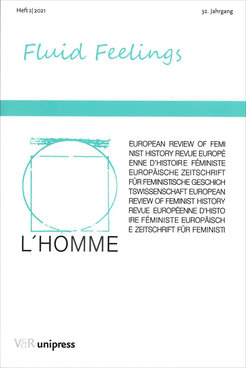
Fluid Feelings
Researchers
Rukmini Barua
Stephanie Lämmert
Alexandra Oberländer
Margrit Pernau
Esra Sarioğlu
Fluid Feelings examines the interplay between gender and emotion and traces the dynamics of rigidity, instability, and fluidity within it. Fluidity, in these essays, comes in several forms and registers: as ambivalence, circulation, and divergence. Our essays explore the interface between the social and the individual as well as the points of tension or cohesion that appear in ways of feeling (out of) gender. In bringing fluidity to the center of our analysis, the special issue advances an understanding of gender, emotions, and their inter-actions as phenomena in motion and in the process of becoming, rather than fixed. With a geographical scope encompassing Zambia, Turkey, Soviet Russia, and India, and drawing on archival histories, individual biographies, ethnographies, and explorations of popular culture, we elaborate how gender categories are strengthened, disturbed, or made ambivalent by emotions.
Key Reference
Feeling Political: Emotions and Institutions Since 1789
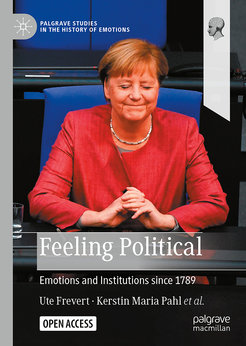
Researchers
Ute Frevert
Kerstin Maria Pahl
Agnes Arndt
Michael Amico
Juliane Brauer
Francesco Buscemi
Karsten Lichau
Hannah Malone
Caroline Moine
Philipp Nielsen
Julia Wambach
Feeling Political: Emotions and Institutions since 1789 deals with the highly topical question of whether and why feelings play a role in politics. Contrary to political theory’s and the general public’s conception of politics as the realm of “rational” decision making, emotions have been potent in political practice since at least the late 18th century. Rather than purely subjective and individual expressions of feeling, emotions in the political sphere are best understood through the institutional settings in which they occur. Whether these are official institutions, buildings, organizations, clubs, parties, or informal gatherings, they provide individuals with emotional templates: guidelines, rules, and models on how to feel and express this feeling. Through 11 case studies of various Western institutions, the book contributes to a dedicated public debate and shows how political participation depends on mobilizing, sharing, and communicating emotions.
Key Reference
Currently, three new projects are being developed at the Center:
Changing the Feeling Rules: How Emotions Reshape Social Relations, c. 1700 to today

Researchers
Stephen Cummins
Kerstin Maria Pahl
Helen Ahner
Michael Amico
Max Jack
Karsten Lichau
Soňa Mikulová
Nagehan Tokdoğan
Mika Toyota
Julia Wambach
Most, if not all, human societies know “feeling rules”: historically and culturally contingent norms and expectations that manage the expression of emotions, judge their appropriateness, and sanction divergences. The project Changing the Feeling Rules explores how existing social formations become unsettled when individuals or groups start contesting what is considered commendable emotional behavior. Foregrounding moments of conflict when social judgments clash and when values, through friction and rupture, become reoriented, the issue sheds new light on historical and social change by looking at shifts in emotions and sensibilities.
A collaboratively developed multidisciplinary work, this special issue currently under review with Social Science History brings together historians, sociologists, and ethnographers. Its case studies cover Europe, the USA, and Japan and range from the late 18th century to today. While drawing from a wide range of sources, including ego-documents, the press, ethnographic research, and sociological interviews, its unifying theme is the role of emotions in uncertain times. With social rupture being a preoccupation of the 21st-century world, this special issue offers a timely investigation into how people emotionally engage with each other in times of transformation.
Volatility and Vulnerability: Global Intersectional Perspectives From the 20th Century to the Present
Researchers
Agnes Arndt
Rukmini Barua
Stephanie Lämmert
Alexandra Oberländer
Esra Sarioğlu
How does our understanding of emotions change when we analyze them in times and places of the highest precarity? What kinds of emotions are experienced in these precarious contexts that bind humans and nonhumans in un-expected ways? Drawing on experiences from eastern Europe, western Europe, and the Global South, this project unpacks emotional dynamics associated with vulnerability and volatility and how they link humans with non-human beings in variegated ways. It is an interdisciplinary and collaborative project that brings together a group of historians and sociologists utilizing intersectional perspectives to study vulnerability and volatility from the 20th century to the present. The authors foreground emotion as an analytical lens to examine the myriad forms of vulnerability and volatility engendered by the dynamics of the capitalist economy and modern political structures, and to emphasize the entanglements of humans and non-human beings within these contexts. All the contributions to this project are united by the preliminary finding that vulnerability and a frequently experienced lack of emotional, physical, material, legal, and social well-being are among the basic constants of the emotional ecology of our globalized world that is not human-centric. However, we argue that despite being shared globally, vulnerability is not universal and that historically produced forms of vulnerability and precarity are unevenly distributed across the globe. Volatility and Vulnerability engages with a wide range of different historical junctures, geographies, and source materials, from Soviet Russian science fiction to Zambian Africanfuturism and various narratives of violence and vulnerability at the turn of the 21st century. It is global–historical in scope and includes case studies from India, South Africa, Zambia, Russia, Turkey, and Germany.
Public Mourning
Researchers
Karsten Lichau
Kerstin Maria Pahl
Parand Danesh
Ute Frevert
Pathetic or embarrassing? Touching or irritating? Should one join in or blaspheme? When emotions are shown publicly, the accusation they are being staged is not far away. The year 2022 once again pressed down on the emotional keyboard, as the death of the longest-serving monarch in English history dominated the world press for nearly 2 weeks. Many people mourned, but many others, especially citizens of the former colonies, refused to do so, and some even celebrated ostentatious joy. Mourning became a bone of contention, political rifts emerged. Who belongs to the community of mourners? Who rejects them? And what is the point of this display of emotion anyway? Another joint endeavor of several researchers will examine the history and present of publicly expressed grief in the face of death.
It will analyze ceremonies, practices, and artistic forms used to mourn the loss of significant public figures and larger groups of people, victims of violence or disasters. It will explore the uses of media and dissemination through the media. Public mourning is not public commemoration, because commemorative culture needs greater distance. But expressions of mourning also follow established traditions, being crucially based on the imitation of emotional repertoires from everyday and high culture.

Public Colloquia, Conferences, and Workshops
Just as the Center itself combines many regional and topical perspectives, we also invite other researchers in the broad and ever-broader field of the history of emotions to the Center. A place that has always been suited to this is our public seminar, organized weekly or fortnightly during the academic year. Since 2008 the Center has hosted more than 250 public colloquia with speakers from all five continents. The need to switch to virtual, then hybrid format during the pandemic was a problem we turned into an advantage: Rather than inviting only researchers who are in the city, we now have the technology and procedures to bring in speakers from distant countries for whom a stay in Berlin is not possible. Nevertheless, we are glad that most talks can once again be on-site events.
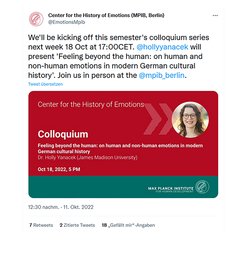
Figure 3. Our social media torch was passed from Francesco Buscemi to Stephen Cummins in 2021. The Center’s Twitter has been an effective tool of outreach, particularly notable for expanding the audience for our virtual colloquia. The account, with 2,000 followers, has been a key way to communicate our research and publications to an international community of historians and the historically minded.
Image: MPI for Human Development
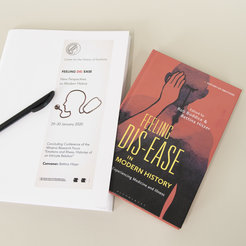
The conference Feeling DIS/EASE: New Perspectives on Modern History in January 2020 (see Research Report 2017–2019/20, p. 89), which concluded Bettina Hitzer’s Minerva Research Focus Emotions and Illness: Histories of an Intricate Relation, resulted in an edited volume published in 2022. It explores experiences of illness, broadly construed, and encompasses the emotional and sensory disruptions that attend disease, injury, mental illness, and trauma. Furthermore, it gives an account of how medical practitioners, experts, lay authorities, and the public have felt about such disruptions. Also in 2022, another edited volume was published that originated from Bettina Hitzer’s follow-up project Adopting a Child in Germany: The Contested Politics of Belonging and Care in a Globalized World, 1945–2000 (see Research Report 2017–2019/20, p. 71). Originating from a workshop at the Center, this book examines change and continuities of childhood in the long 20th century in the context of adoption. As an interface between the private and public spheres, child adoptions enable conclusions to be drawn about socio-cultural changes in the understanding of childhood and family, of the welfare state, care, solidarity, charity, and humanitarianism, as well as about questions of identity.
Key References
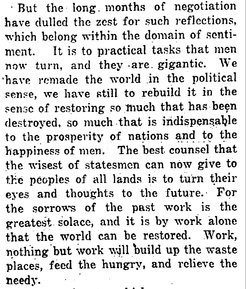
As a member of the British delegation to the Versailles Peace Conference after the First World War, John Maynard Keynes had detailed knowledge of the debates about the reparations demanded of Germany. He believed the demands were too harsh, resigned his position, and wrote his book The Economic Consequences of the Peace (1920). Since then, many historians have pointed to the economic and political burden imposed especially on the new states that emerged from their predecessors’ lost wars. A century after the peace treaties of 1919–20, Ute Frevert and Chris Hann (MPI for Social Anthropology, Halle) organized a hybrid conference, The Emotional Consequences of the Peace (Berlin, 10–11 December 2020). It focused on and reevaluated the histories of defeated nations by zooming in on their emotional dimensions. Those were, as the conference showed, manifold and cannot be reduced to the narrative of humiliation as it had been crafted by politicians and the media during the peace-making period of 1919–20. Even citizens of defeated countries could escape that tale and choose to look forward rather than backward. They could—and did—speak of liberation and a new beginning, a new understanding of national belonging and self-determination. Eventually, though, the narrative of liberation failed, in Germany as well as in Austria and Hungary, and the narrative of humiliation won. Losers consolidated long-lasting tales of loss, humiliation, and revenge. Historians and anthropologists joined forces to analyze those tales and their influence on politics and culture in succeeding generations, including the memory politics of 21st-century central Europe.
In June 2021, Emma Zohar organized a two-day event in Berlin on the topic Fatal Attraction: Germany, Poland and the Jews After the Holocaust, together with Gideon Reuveni (University of Sussex) and Daniel Mahla (Ludwig-Maximilians-Universität München). The online workshop aimed to explore the dramatic transformation that images of and feelings toward Poland and Germany in Israel and beyond have been undergoing in recent years. The participants examined the emotional economies that inform such perceptions, most visible in diplomatic relationships between the countries but also in the press and scholarly discourse. They also investigated how those economies affected tourism and other economic affairs.
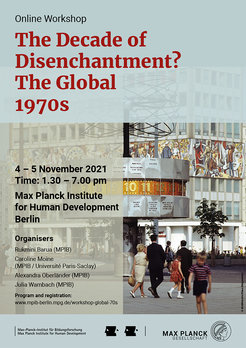
In 2019, Rukmini Barua, Caroline Moine, Alexandra Oberländer, and Julia Wambach started a reading group on the emotional dimensions of the global 1970s. Its aim was to critically revisit perspectives on the 1970s, which are usually conceptualized as the start of a new wave of globalization, but also as a decade of “disenchantment” and “malaise.” An online workshop titled The Decade of Disenchantment? The Global 70s was held in autumn 2021 to discuss critical and diverse viewpoints on the emotional phenomena of this decade as experienced across the globe. The workshop resulted in a special journal issue. It includes contributions from junior and senior scholars that focus on gay liberation struggles in Latin America, decolonial movements in Palestine, the New International Economic Order, the North American Left, and forms of post-imperialist belonging in New Zealand and Australia. The special issue proposes, firstly, that feelings recalibrated understandings of the global, from a view that divided the world in terms of the East and West to one that saw it in terms of North and South. Secondly, the articles demonstrate that feelings of passion, anger, and solidarity—among others—counter arguments that the 1970s were a time of disenchantment and the atomization of people through economic malaise.
Key Reference
The workshop Lonely Death and Contact-less Sociality (24–25 November 2022) was held in Berlin by Mika Toyota in collaboration with Kristine Krause (University of Amsterdam, Faculty of Social and Behavioural Sciences, Anthropology of Health, Care and the Body). It explored three key themes: 1) The causes and multiple forms of lonely dying in different parts of the world; 2) emerging service industries around death and dying, and 3) forms of socialities in contact-less society. Findings from various societies including Japan, the UK, Germany, and Ukraine were presented at the workshop. The papers were circulated among the participants beforehand for the purpose of intensive discussion during the workshop.
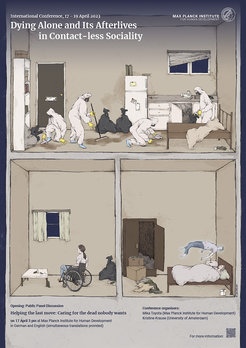
The workshop deepened our conceptual understanding of the social phenomenon of “lonely death” in the contemporary context of “contact-less sociality.” More specifically, the participants explored the following questions: In what ways does contemporary communication technology change the meaning of “social isolation” (social connection/disconnection), “loneliness,” and “solitude,” and how does it affect the end of life phase? What kind of new service industries are emerging around death and dying, and what kind of practical functions and emotional effects do these industries have? How can we understand the dead body as a socio-material actor which is institutionally shaped and responds to the public imaginaries?
This workshop led to the concept for a larger conference, Dying Alone and Its Afterlives in Contact-less Sociality, in April 2023, inaugurated with a public panel discussion Helping the Last Move: Caring for the Dead Body and accompanied by Oxford Brookes University PhD researcher Katie Taylor's exhibition residual.
Internal and External Cooperation
In 2022, Frederik Schröer launched a new international collaboration Fear in Times of Uncertainty with researchers from the universities of Manchester, Oslo, Lund, Copenhagen, and North Carolina (Raleigh). The project grew out of an earlier collaboration titled The Aesthetics and Emotions of Religious Belonging, but it shifts the focus to fear as a defining emotion of the present and past. The aim is to develop critical innovations in the study of fear in an international and interdisciplinary network of early career to senior scholars. Bringing their diverse expertise into dialogue, the group explores fear in times of uncertainty from historical and contemporary perspectives, in a broad range of contexts spanning Asia and Latin America, fostering new understandings of what fear does, what its politics are, and how it mediates between the individual and the social or the environmental. Frederik Schröer’s contribution to the project is both conceptual and historiographic, concentrating on fear in forested environments. Alongside planned academic activities and output, his work has already included public outreach in the form of radio interviews/podcasts with German DLF Nova and Swiss SRF.
Key References
Fear/anxiety is also the focus of an in-house collaboration between the Center for the History of Emotions and the Lise Meitner Group for Environmental Neuroscience, which leverages the Institute’s critical interdisciplinary potential. Launched in early 2021, the collaborative Study of Forest Anxiety sees Frederik Schröer collaborate with Djo Juliette Fischer under the supervision of Simone Kühn. Using standard testing methods on a wide range of participants, the study assesses implicit and explicit indicators of semantic and image-based associations between the concept of forest and anxiety. Interdisciplinarity here proves valuable both in re-examining fundamental parameters and heuristic presuppositions of the study, as well as in reflecting on the larger implications of the future results. Beyond the local German context, in 2022 the team launched an international collaboration with the Indian Institute of Technology, New Delhi, for cross-cultural comparison.
In 2022, Kerstin Pahl joined Simone Kühn and Johanna Drewelies on the project BASE-II, which investigates the physical, cognitive, and social conditions that lead to successful aging. As the study uses interviews of people aged 70 to over 100 years who lived in former West Berlin, it became apparent that a historical perspective would be essential to understand both the context of the interviewees’ lives and their ways of relating them. Kerstin Pahl has worked extensively on the conventions of (auto-)biographical story-telling. Her forthcoming book on biography and portraiture provides an in-depth analysis of how people employ tropes, templates, and narratives to tell (and make sense of) lived experience, a perspective that helps to bring forward an interpretation of the data that is sensitive to context. (Read more about the project Visualizing Lives)
Key References
Co-organized by the Franco-German University (UFA) in Saarbrücken, the Basque Anthropological Research Institute on Music, Emotions, and Societies (ARI) in Bayonne, France, and the MPI for Human Development, two Franco-German Autumn Schools, Une anthropologie des émotions. Questions d’épistémologie and Émotions situées, took place in October 2021 and 2022 in Bayonne, hosted by Denis Laborde, the director of the ARI, and the Center’s researcher Karsten Lichau. The events provided participants with the opportunity for network-building through concentrated in-depth discussions on-site, and led to several visiting fellowships at our Center.
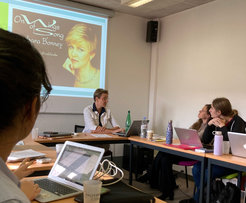
While the program of the first event in 2021 focused on epistemological questions in emotion research, and initiated a dialogue between anthropological and historical approaches, as well as affect theory and the so-called performative turn, the 2022 Autumn School took up these discussions, inquiring into the relevance of “transversal” emotional experiences or “second-order emotions” like authenticity, hypocrisy, indifference, and hilarity within a practice theory perspective.
The internationality and pluridisciplinarity of both the participants and the teaching scholars enabled an extraordinarily rich exchange, spanning topics from shame in the music of the Noon in Sénégal, via peasants’ courses in emotional communication with animals, to the transnational judicial history of collective crimes in Kamenets-Podolsk. It was crowned by Cédric Villani’s (winner of the 2010 Fields Medal) exploration of emotions in mathematics.
Cooperation with the Haizebegi Music Festival, organized by the ARI, and the Fête de la Science (CNRS) not only initiated exchange with artistic experience and knowledge, but also transmitted research on the anthropology and history of emotions to a larger public.
After a promising start in 2019, collaboration with the Center of Excellence in the History of Experiences (HEX) was directly affected by the March 2020 lockdown. In 2021, postdoc researcher Reetta Eiranen, working on the project Gender, Experience and Ambivalent Nationalism in Nineteenth-Century Finland, was finally able to discuss her 2022 Routledge article “Emotions and Nationalism” in our internal colloquium. Exchanges with the HEX Center, based at the University of Tampere and funded by the Academy of Finland, gradually got back on track with the visit of some familiar faces in 2022. More Finnish researchers who are collectively exploring how religion, the nation, and the welfare state have been experienced in modern history have announced their plans to visit for 2023.
One of the longest-lasting and particularly fruitful collaborations links the Center for the History of Emotions with London’s Queen Mary Centre for the History of Emotions. Its most visible expression remains the successful book series with OUP–Emotions in History–established and edited by Ute Frevert and Thomas Dixon. The series explores emotions through the histories of science, medicine, and psychology, as well as literature, art, religion, politics, and economics, covering the period from the Middle Ages to modern times. Since the publication of the first volume in 2014, 20 monographs have appeared, nine of them in the reporting period since 2020.
In November 2020, Thomas Dixonʼs lecture What is the History of Anger a History of? re-opened the series of public seminars after the short break due to COVID-19 and marked the Center’s very first public online event.
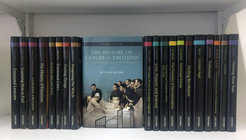
Key Reference
(English translation: Hitzer, B. (2022). The history of cancer and emotions in twentieth-century Germany. Oxford: Oxford University Press.)
Visiting Researchers and New Colleagues
Due to COVID-19, the Center’s open-door policy came to a halt in 2020. Since the start of the Center, more than 130 researchers from all over the world had come to work with us—all financed through their own fellowships or sabbaticals. Some stayed for a few days, most for a few months, and some even for a whole year or longer. This allowed for vivid and fruitful exchange and was of mutual benefit. The program has now been revived and scholars from many academic fields are coming to us again in growing numbers. Old ties have proven to be strong and former visitors—such as Holly Yanacek—return to present their work that they had begun while at the Center.
We have also welcomed back former researchers who left the Center in order to take up academic positions nationally and internationally. During the reporting period and foreshadowing the Center’s imminent closure in 2024, several have accepted offers for tenured professorships. Others, mostly in their early postdoc stage, have joined the Center to start new individual and collaborative projects.
New Research Foci
A working group on Sport & Emotions was established on the initiative of Helen Ahner, Max Jack, and Julia Wambach. They start from the observation that emotions in sports are omnipresent: In major tournaments, tears of happiness, tears of disappointment, exuberant joy, and shattering pain—to name but a few—are broadcasted and touch spectators all over the world. Doing and watching sport has become an integral part of everyday life for many in the last 150 years. The emotions evoked by sport are central to this striking popularity. However, sports history has neglected the history of emotions, and vice versa.
Based on these observations, an interdisciplinary team has begun exploring the nexus of sports and emotions, and its historical development in confluence with colonialism, industrialization, and globalization. The researchers examine sport as a training ground for emotional practices that reproduce or at times reconfigure social dynamics with implications extending beyond sporting practice itself.
How do hardcore fan groups conjure feelings in order to undermine the power of restrictive sport organizations? How can emotional attachment to a regional soccer club help ease the pain of deindustrialization? How did 1920s “sportsgirls” claim the right to feel competitive? These questions prompted an intervention at the Long Night of the Sciences in July 2022, which attracted a large audience beyond the academy. Furthermore, a workshop in August 2022 encouraged teenage athletes from Israel, Germany, and Ukraine to engage with the history of German–Jewish athlete Lilli Henoch. In a workshop titled Feeling Competitive–Sport as Affective Practice in the summer of 2023 scholars from multiple disciplines worked on a special issue that will lay the groundwork for a history of sport emotions.
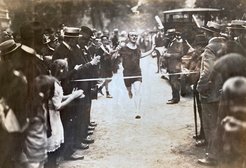
New research at the Center also focuses on the emotional politics of right-wing movements. In spring Olga Reznikova joined the Center and a new working group that has been assembling, since January 2023, around our new colleague Maik Tändler. Under his lead researchers including Max Jack, Frederik Schröer, Nagehan Tokdoğan, and Julia Wambach aim to explore Heartlands, Emotions, and Collective Identities. The claim to speak up for the “pure people” against a “corrupt elite” is a central feature of populist rhetorics. Usually, “the people” of populism, particularly its right-wing version, is not identical with a country’s population as a whole, but designates only a particular subgroup deemed to be the “true” people by certain criteria, be these social, ethnic, cultural, religious, moral, or sexual. Political scientist Paul Taggart has coined the term heartland to refer to such an imagined community of an idealized people. The project’s premise is that emotionally charged imaginations of a heartland can be considered a means of constructing group identities also beyond the context of populist mobilization. The new working group aims to put this hypothesis to the test by applying it to a range of different research topics. The planned outcome is a collaborative publication that contributes to our understanding of the emotional dynamics of collective identity formation.












